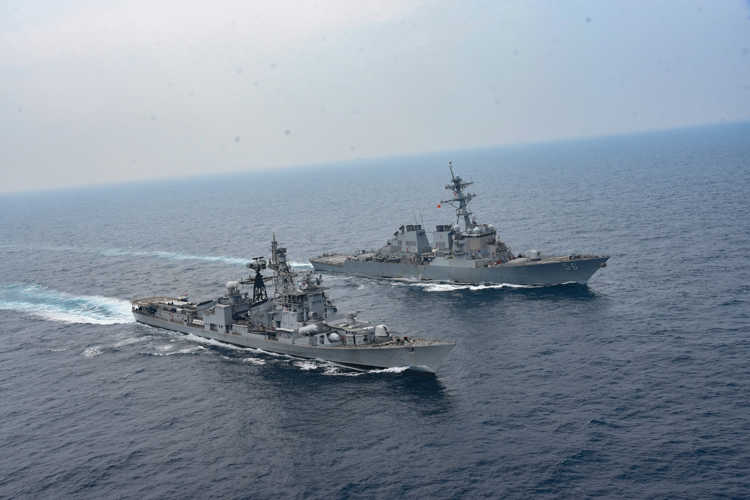

The Indian Navy (IANS)
<p>
It has been a busy month for the members of the Quadrilateral Security Dialogue (QSD), or the Quad, comprising Australia, India, Japan and the US who are also its original architects. The 3rd Quad Ministerial Meeting was held on 18 February during which the members <a href="https://mea.gov.in/press-releases.htm?dtl/33540/3rd_IndiaAustraliaJapanUSA_Quad_Ministerial_Meeting">emphasised </a>their &ldquo;commitment to upholding a rules-based international order, underpinned by respect for territorial integrity and sovereignty, rule of law, transparency, freedom of navigation in the international seas and peaceful resolution of disputes&rdquo;.</p>
<p>
A week later, senior officials of <a href="http://www.businessworld.in/article/Senior-officials-of-India-France-Australia-discuss-further-cooperation-in-Indo-Pacific/24-02-2021-381246/">Australia, France and India</a> met and discussed the next steps to be taken for furthering trilateral cooperation in the Indo-Pacific region. Interestingly, their agenda included majority of the issues that were discussed during the 3rd Quad Ministerial meeting. Meanwhile, Australia, Japan and the US conducted their annual joint drills&mdash;Cope North 2021, at Guam, which focused on humanitarian assistance and disaster relief training to enhance readiness when there is a need for deploying a large force.</p>
<p>
Since the revival of the Quad in 2017, many countries have attempted to engage it and the QSD members have not shied from including them. For instance, in 2019, the Philippines Navy joined navies of India, Japan, and the US and conducted manoeuvres in the South China Sea. Similarly, Australia, Japan, and the US militaries held military Exercise Pacific Vanguard off Guam which included South Korea. Though not a member of the Quad, France spear headed the Exercise La Perouse in the Bay of Bengal involving Australian, French, Japanese and US navies.</p>
<p>
Even Quad members are building issue-based networks among themselves that could exclude one of the partners. For instance, in 2020, Australia, India and Japan conceptualized Resilient Supply Chain Initiative (RSCI) to diversify procurement and overcome the risks of overdependence on a single source which could result in disruptions. <a href="https://www.state.gov/blue-dot-network/">The Blue Dot Network</a>, a regional infrastructure initiative is driven by US, Australia and Japan and aims to &ldquo;promote quality infrastructure investment that is open and inclusive, transparent, economically viable, financially, environmentally and socially sustainable, and compliant with international standards, laws, and regulations&rdquo; with China&rsquo;s Belt Road Initiative (BRI) and issues of &lsquo;debt trap&rsquo; in mind. Australia, India, Japan and the US were planning to join the UK led 5G alliance of ten democracies an alternative to Huawei, the Chinese telecommunications giant, amid concerns about espionage and cyber security risks.</p>
<p>
There are at least three reasons for the ongoing transmutations in the Quad. First, is the suppleness and flexibility in the QSD which allows Members to join/leave the grouping based on respective national interests. Japan, Australia and Singapore chose to disassociate themselves from the Quad ostensibly due to pressures from China; Japan and Australia have rejoined the Quad but Singapore prefers to stay away.</p>
<p>
Second, there is space for non-quad actors to &lsquo;participate in&rsquo; and &lsquo;partake from&rsquo; the Quad activities. In this context the Philippines and South Korean Navy joining the Quad naval manoeuvres is a good example.</p>
<p>
Third can be attributed to the attractiveness of the grouping whose agenda is to stand-up to the revisionist power. The growing Chinese assertiveness has rattled the smaller powers of the ASEAN particularly the claimants to the South China Sea. These countries have been at the receiving end of the Chinese coercion and are unwilling to fait accompli. They hope to challenge China with support from the Quad.</p>
<p>
It is useful to mention that China has been enacting/revising several laws relating to national security and defence. For instance, the 2020 Law on National Defence (LND) does not rule out use of force to protect Chinese overseas interests through naval escort missions, drills and operations. Similarly, the revised Chinese Coast Guard law envisages new &lsquo;rules of engagement&rsquo; that permits use of force to enforce China&rsquo;s maritime claims. Under this law Chinese Coast Guard is authorized to &ldquo;take all necessary measures, including the use of weapons, when national sovereignty, sovereign rights, and jurisdiction are being illegally infringed upon by foreign organizations or individuals at sea.&rdquo;</p>
<p>
There are clear signs that numerous permutations and combinations of the Quad can be expected in the future and more States such as the United Kingdom, Germany, Canada, etc., could be willing to challenge China&rsquo;s growing assertiveness through the Quad.</p>
<p>
<em>(Dr Vijay Sakhuja is former Director National Maritime Foundation, New Delhi)</em></p>
The Russian military has carried out a series of strikes on Ukrainian military-related targets in…
India's toy industry, once heavily dependent on imports, is now manufacturing domestically and exporting to…
Members of the Indian diaspora and several artists in Argentina welcomed Prime Minister Narendra Modi…
Sub Lieutenant Astha Poonia officially became the first woman to be streamed into the fighter…
As Israel awaits Hamas's response on Friday to the latest proposal for a hostage release…
Deputy Chief of Army Staff (Capability Development and Sustenance), Lieutenant General Rahul R Singh, on…